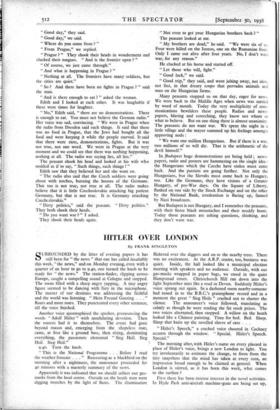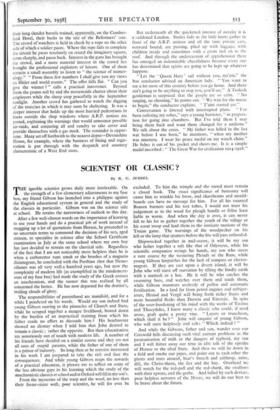HITLER OVER LONDON
By FRANK SINGLETON
SURROUNDED by the litter of evening papers it has still been for " the news " that one has called insatiably this week, " the news," and on Monday evening, even with a quarter of an hour to go to 9.4o, one turned the knob to be ready for " the news." The station-finder, slipping across Europe, caught a compelling sound at Cologne and stopped. The room filled with a sharp angry yapping. A tiny angry figure seemed to be dancing with fury in the microphone. The master of our destinies was addressing the faithful and the world was listening. " Mein Freund Goering . . . " Roars and more roars. They punctuated every other sentence, till the voice finished.
Another voice apostrophised the speaker, pronouncing the words " Adolf Hitler " with annihilating devotion. Then the roarers had it to themselves. The event had gone beyond reason and, emerging from the shapeless roar, came, at first like a ground bass, then rising, dominating everything, the passionate elemental " Sieg Heil. Sieg Heil. Sieg Heil."
9.4o. Turn the knob.
" This is the National Programme . . . Before I read the weather forecast . . . " Reassuring as a blackbird on the morning after a nightmare, the announcer proceeded for 4o minutes with a masterly summary of the news.
Apparently it was indicated that we should collect our gas- masks from the local centre. Outside on the heath men were digging trenches by the light of flares. The illumination flickered over the diggers and on to the nearby trees. There was no excitement. At the A.R.P. centre, too, business was quiet. Inside, the hall looked like a municipal election meeting with speakers and no audience. Outside, with our gas-masks wrapped in paper bags, we stood in the quiet Hampstead street. Christchurch Hill ran down into the light September mist like a road in Devon. Suddenly Hitler's voice sprang out again. In a darkened room nearby someone had tuned in to the B.B.C.'s gramophone record and in a moment the great " Sieg Heils " crashed out to shatter the silence. The announcer's voice followed, translating as calmly as though he were reading the fat stock prices. The two voices alternated, then stopped. A willow on the heath looked like a Chinese painting. Time for bed. Bed. Sleep. Sleep that knits up the ravelled sleeve of care . . .
" Hitler's Speech," a cracked voice shouted in Cockney accents through the window. " Special. Hitler's Speech. Special."
The morning after, with Hitler's name on every placard in place of Hitler's voice, brings a new London to light. You try involuntarily to estimate the change, to form from the tiny snapshots that the mind has taken at every turn, an impression broad enough to be claimed as general. When London is stirred, as it has been this week, what comes to the surface ?
First there has been intense interest in the novel activities. In Hyde Park anti-aircraft machine-guns are being set up, their long slender barrels trained, apparently, on the Cumber- land Hotel, their backs to the site of the Reformers' tree. The crowd of watchers is held in check by a rope on the other side of which a soldier paces. Where the rope fails to complete the circuit he paces resolutely on round the imaginary square, turns sharply, and paces back. Interest in the guns has brought the crowd, and a more material interest in the crowd has brought the professional exploiters of leisure. One of them attracts a small assembly to listen to " the science of numer- ology." " From these few numbers I shall give you my views on Hitler and world events." The offer falls flat. " Can you give the winner ? " calls a practical intervener. Beyond them the prams roll by and the nursemaids chatter about their employers while the sheep crop peacefully in the September sunlight. Another crowd has gathered to watch the digging of the trenches in which it may soon be sheltering. It was a deeper interest that holds up the most hurried pedestrians in knots outside the shop windows where A.R.P. notices are posted, explaining the warnings that would announce possible air-raids, and conjuring all and sundry to take cover and provide themselves with a gas mask. The reminder is oppor- tune. Many set off forthwith to the nearest depot—Devonshire House, for example, where the business of fitting and regis- tration is put through with the despatch and courtesy characteristic of a West End store. But underneath all the quickened interest of novelty it is a saddened London. Smiles fade as the little knots gather in front of the A.R.P. notices and all the time private cars, outward bound, are passing, piled up with luggage, with children inside and sometimes with a pram tied on to the roof. And through the undercurrent of apprehension there has emerged an indomitable cheerfulness because every one has determined that spirits are going to be kept up whatever happens.
" Let the ' Queen Mary' sail without you, ma'am," the bus conductor advised an American lady. " You want to see a lot more of this country before you go home. And there ain't going to be anything to stop you, you'll see." A Turkish gentleman is surprised that the people are so calm. " No singing, no shouting," he points out. " We wait for the music to begin," the conductor explains. " T'aint started yet."
Conversation is littered with interrupted plans. " I've been ordering my robes," says a young barrister, " in prepara- tion for going into chambers. But I've told them I may bring them back and want them changed for a uniform." We talk about the crisis. " My father was killed in the last war before I was born," he mentions, " when my mother was nineteen. I wear his peace medal on my watch chain." He fishes it out of his pocket and shows me. It is a simple medal inscribed : " The Great War for civilisation 1914-1918."















































 Previous page
Previous page